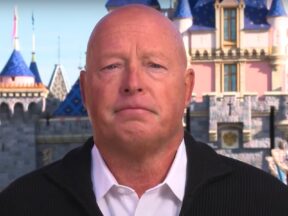

Under New Bill, Florida Governor Ron DeSantis Would Take Over Disney World’s Self-Taxing District
Florida legislators are considering a new bill that would finalize governor Ron DeSantis’ plans to strip the Walt Disney Company of much of its self-governing status in the state.
How does the current system work? Disney World parks and resorts are currently located in the Reedy Creek Improvement District, established by the company and the state of Florida in 1967. Under the terms of that agreement, the Walt Disney Company taxes itself to pay for and organizes services on its property that would otherwise be provided by the state of Florida. These include fire protection, emergency services, water, utilities, sewage, and infrastructure. At present, the district’s Board of Supervisors is chosen by the landowners within the district – Disney and its affiliates – on a one-vote-per-acre basis.
What would change? Under the proposed legislation, the property would be renamed the Central Florida Tourism Oversight District. Instead of the board being chosen by the landowners, the five members would be appointed by the governor and confirmed by the state Senate. Importantly, the law would prohibit anyone who has worked for Disney or other theme park operators within the past three years, as well as their relatives, from serving on the board.
What would stay the same? If Reedy Creek had been dissolved rather than reorganized, as DeSantis originally threatened it would be last year, experts argued that the financial burden for infrastructure services provided by Disney would have fallen on taxpayers’ shoulders. The current reorganization would keep Disney on the hook for those expenses, but the new state-appointed board would decide how Disney is taxed and how public services will be provided.
Criticisms of the new plan: Critics of the new legislation argue that by excluding anyone with recent theme park experience, the new board will be ill-equipped to run a district that is almost entirely occupied by parks and resorts.
Why make these changes? DeSantis’ spokesperson Bryan Griffin tweeted: “Reedy Creek gifted extraordinary special privileges to a single corporation. Until @GovRonDeSantis acted, @Disney maintained sole control. This amounted to an unaccountable Corporate Kingdom. This is over, and we are beginning a new era of accountability and transparency.”
However, skeptics argue that the decision was far more personal. Last year, former Disney CEO Bob Chapek put the company in DeSantis’ crosshairs when the executive belatedly spoke out against the Parental Rights in Education bill (or the “Don’t Say Gay” law, per its critics). Chapek’s response to that legislation came late enough to anger employees while also alienating Disney from DeSantis and his allies. The governor responded by calling Disney a “woke” corporation and backing plans to remove Disney’s self-governing status.
What will happen after the changes? If the bill is passed into law, Disney will certainly unleash an army of lawyers to challenge it. The company stands to lose a tremendous amount of autonomy and control over its Orlando theme parks if it is not allowed representation on the board which oversees the infrastructure of the property and how Disney is taxed to pay for it.
What’s Disney saying? In a statement, Walt Disney World Resort president Jeff Vahle said:
“We are monitoring the progression of the draft legislation, which is complex given the long history of the Reedy Creek Improvement District. Disney works under a number of different models and jurisdictions around the world, and regardless of the outcome, we remain committed to providing the highest quality experience for the millions of guests who visit each year.
Photo credit: Courtney Kiefer/The Walt Disney Company.



